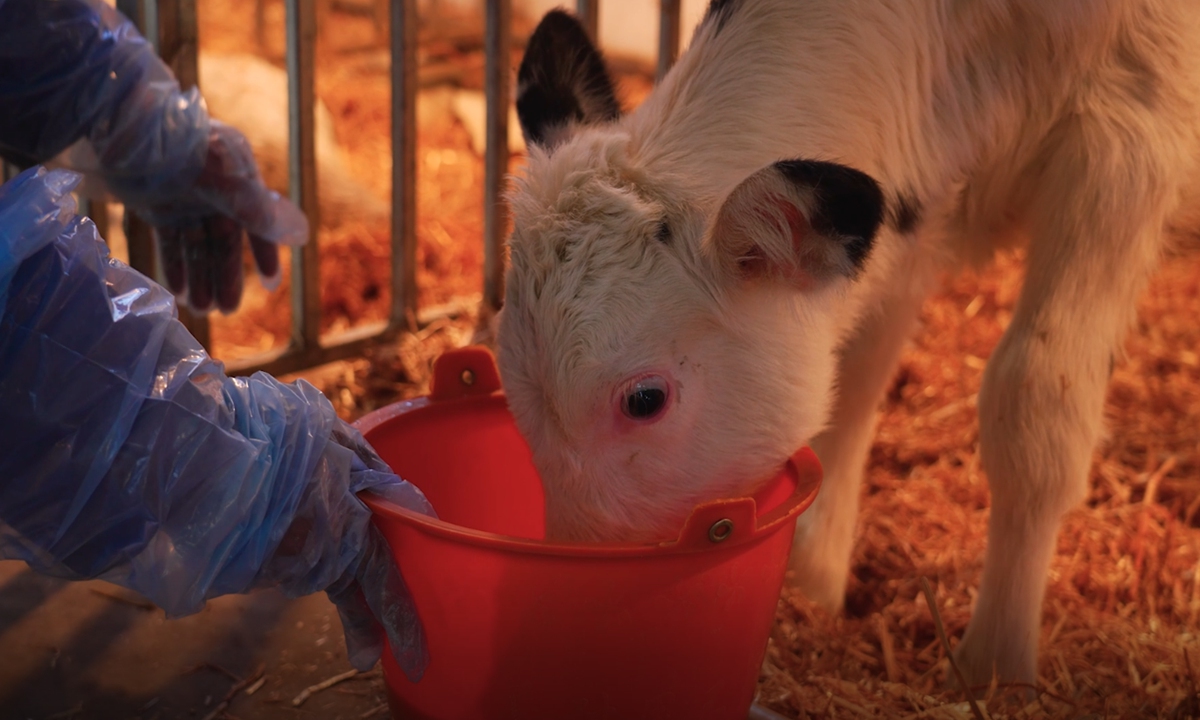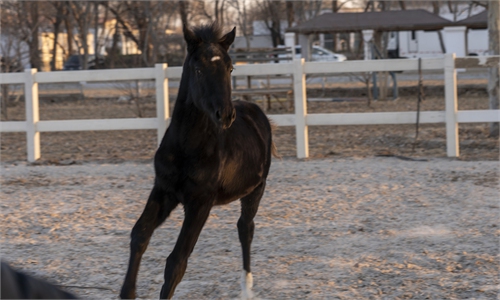Clones of super cows born in NW China, to help avoid stranglehold in dairy industry: project leader

A newborn calf at a farm in Northwest China's Ningxia Hui Autonomous Region. Photo: Courtesy of Northwest A&F University
Scientists with the Northwest A&F University successfully saw the births of three cloned cows with highly desired traits in Northwest China's Ningxia Hui Autonomous Region recently, marking the first successful effort by Chinese scientists to collect, restore and conserve the germplasm resource of "super cows" in China with the somatic cell nuclear transfer method and efficiently reproduce them.
The first calf weighs 56.7 kilograms and was 76 centimeters tall and 113 centimeters long at birth, and it bore the exact shape and skin pattern of its cloned target, read a press release from Northwest A&F University on Tuesday.
The calf, along with two others, came from cloned targets raised in different farms in China. These are super cows, capable of producing 18 tons of milk a year and over 100 tons of milk in a lifetime.
Jin Yaping, the project's lead, told the Global Times on Tuesday that the breakthrough has great significance for China to concentrate and preserve in an economically feasible way the very best cows in the country, and it is a success in the country's efforts to revitalize its agricultural sector with vital seed and breeder animals.
For dairy cows, China is 70 percent reliant on overseas purchases, the press release said.
China has roughly 6.6 million cows - the famed highly productive breed Holstein Friesian cattle - that were imported over the years.
However, only about five in 10,000 such cattle in China are highly productive, long-lived and stress-resistant at the same time in their living environment in China, factoring in such issues as the climate.
Also, some super cows were not identified until nearly the end of their lives and their genes were lost as they died, which is a loss to the country, Jin said. Also, since the cows are scattered among farms across China, breeding becomes technically difficult.
Industry insiders revealed that some countries have banned the sales of Holstein Friesian cattle to China, while countries that do sell such cows to China face exhaustion as China rapidly expands the scale of its Holstein Friesian cattle herds with constantly improving demand for dairy products as the ranks of the Chinese middle class swell.
By taking some tissue from a cow's ear, scientists led by Jin, in the words of the press release, "reincarnated" these super cows, which is a prerequisite for the breeding of China's own super cows.
The new method unveiled on Tuesday means that people can preserve the genes of these super cows in a timely manner, produce a concentrated herd of super cows, and provide excellent resources for future breeding and selection of China's proprietary super cows, according to Jin.
"Using cloning technology alone won't have any economic meaning, and the combination of tapping reproductive technology and using low-productive cows as surrogates allowed us to reproduce 20 more offspring compared with just using cloning for a given time period," Jin said.
Among the first batch of 120 cloned embryos, 42 percent were impregnated and about 17.5 percent were still fertile at Day 200, the press release said, stating the further maturity of the technology.
In recent years, China has prioritized self-reliance of vital seeds and doubled down on seed technology investment in an effort to beef up its food security.
Major breakthroughs are also being achieved in "bottleneck" seed sectors such as corn, soybeans, broiler chickens and breeding pigs, helping to further reduce reliance on imports amid rising geopolitical risks.
"We plan to take two to three years to build up a herd comprised of over 1,000 super cows, as a solid foundation to tackle China's reliance on overseas dairy cows and the issue of the risk of being 'choked'," noted Jin.


